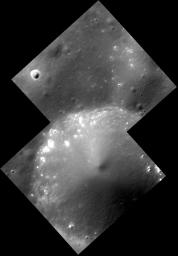
|
Hollow Dali
- Click the image above for a larger view
- Full-Res JPEG (771 x 1110) (64.2 kB)
- Full-Res TIFF (771 x 1110) (856.9 kB)
Caption:
This crater is approximately 170 km southwest of the flooded Dali basin , along the rim of an old, mostly flooded basin. The rims of Dali and nearby flooded basins are composed of low reflectance material , which is often seen in conjunction with hollows. Indeed, scattered hollows appear along the rim of this small, simple crater .
This image was acquired as a high-resolution targeted observation. Targeted observations are images of a small area on Mercury's surface at resolutions much higher than the 200-meter/pixel morphology base map. It is not possible to cover all of Mercury's surface at this high resolution, but typically several areas of high scientific interest are imaged in this mode each week.
Date acquired:
November 20, 2014
Image Mission Elapsed Time (MET):
58851699
Image ID:
7468576, 7468577
Instrument:
Narrow Angle Camera (NAC) of the Mercury Dual Imaging System (MDIS)
Center Latitude:
42.94°
Center Longitude:
115.3° E
Resolution:
9 meters/pixel
Scale:
The largest crater in the scene is approximately 5.5 km (3.4 mi.) across.
Incidence Angle:
51.6°
Emission Angle:
2.2°
Phase Angle:
49.3°
Background Info:
The MESSENGER spacecraft is the first ever to orbit the planet Mercury, and the spacecraft's seven scientific instruments and radio science investigation are unraveling the history and evolution of the Solar System's innermost planet. During the first two years of orbital operations, MESSENGER acquired over 150,000 images and extensive other data sets. MESSENGER is capable of continuing orbital operations until early 2015.
For information regarding the use of images, see the MESSENGER image use policy .
Cataloging Keywords:
| Name | Value | Additional Values |
|---|---|---|
| Target | Mercury | |
| System | ||
| Target Type | Planet | |
| Mission | MESSENGER | |
| Instrument Host | MESSENGER | |
| Host Type | Orbiter | |
| Instrument | Mercury Dual Imaging System (MDIS) | |
| Detector | Narrow Angle Camera (NAC) | |
| Extra Keywords | Crater, Grayscale, Map, Radio | |
| Acquisition Date | ||
| Release Date | 2015-01-16 | |
| Date in Caption | 2014-11-20 | |
| Image Credit | NASA/Johns Hopkins University Applied Physics Laboratory/Carnegie Institution of Washington | |
| Source | photojournal.jpl.nasa.gov/catalog/PIA19023 | |
| Identifier | PIA19023 | |
